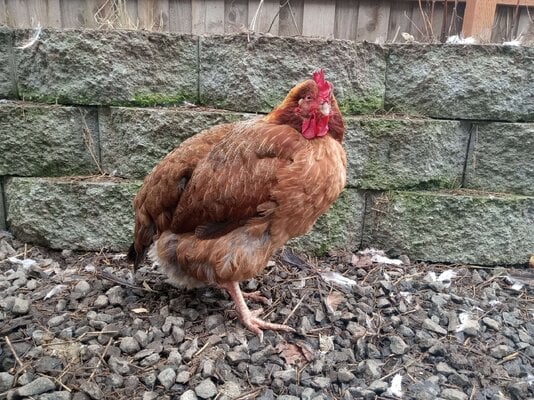Hey all,
Our 1-year old welsummer hen has started acting sluggish and lethargic over the past 2-3 days. Upon examination, we found that her abdomen was swollen and significantly hotter than that of our other five hens. She's also extremely thin, with her keelbone being very prominent. (All of our hens are a little thin at the moment, due to issues with feed, but nowhere near as thin as she is.)
She doesn't seem to have any injuries or discharge from her eyes or nose, and her vent is unimpacted and appears fine. Last time I checked, her poop was on the watery side. Her comb appears to have taken on a darker red tone. I don't believe she's been laying recently, but I passed this off as part of molting season, since the flock is doing that right now.
Both she and the rest of our flock have had rougher living conditions recently (slightly more exposure to the elements), as a new coop in in the process of being built, but they've still had access to plenty of shelter, dry food, water, etc. There is the potential that she ate a bit of styrofoam, but beyond that I can't think of anything that stands out as unusual.
They're currently on an organic 18% layer pellet with pumpkin after a the flock lost weight while on purina layena+ 16% pellet.
All of our other chickens are, as previously stated, a bit thin, but otherwise lively and healthy. One has a slightly pale comb, but otherwise acts fine. We're bringing her inside to continue monitoring her, as well as to give her a break from the rainy Oregon autumn.
Any insights as to what might be going on are appreciated.
(Edit: I forgot to mention that when I palpated her abdomen, it was soft and squishy. I didn't feel any hard spots or lumps.)
Our 1-year old welsummer hen has started acting sluggish and lethargic over the past 2-3 days. Upon examination, we found that her abdomen was swollen and significantly hotter than that of our other five hens. She's also extremely thin, with her keelbone being very prominent. (All of our hens are a little thin at the moment, due to issues with feed, but nowhere near as thin as she is.)
She doesn't seem to have any injuries or discharge from her eyes or nose, and her vent is unimpacted and appears fine. Last time I checked, her poop was on the watery side. Her comb appears to have taken on a darker red tone. I don't believe she's been laying recently, but I passed this off as part of molting season, since the flock is doing that right now.
Both she and the rest of our flock have had rougher living conditions recently (slightly more exposure to the elements), as a new coop in in the process of being built, but they've still had access to plenty of shelter, dry food, water, etc. There is the potential that she ate a bit of styrofoam, but beyond that I can't think of anything that stands out as unusual.
They're currently on an organic 18% layer pellet with pumpkin after a the flock lost weight while on purina layena+ 16% pellet.
All of our other chickens are, as previously stated, a bit thin, but otherwise lively and healthy. One has a slightly pale comb, but otherwise acts fine. We're bringing her inside to continue monitoring her, as well as to give her a break from the rainy Oregon autumn.
Any insights as to what might be going on are appreciated.
(Edit: I forgot to mention that when I palpated her abdomen, it was soft and squishy. I didn't feel any hard spots or lumps.)




